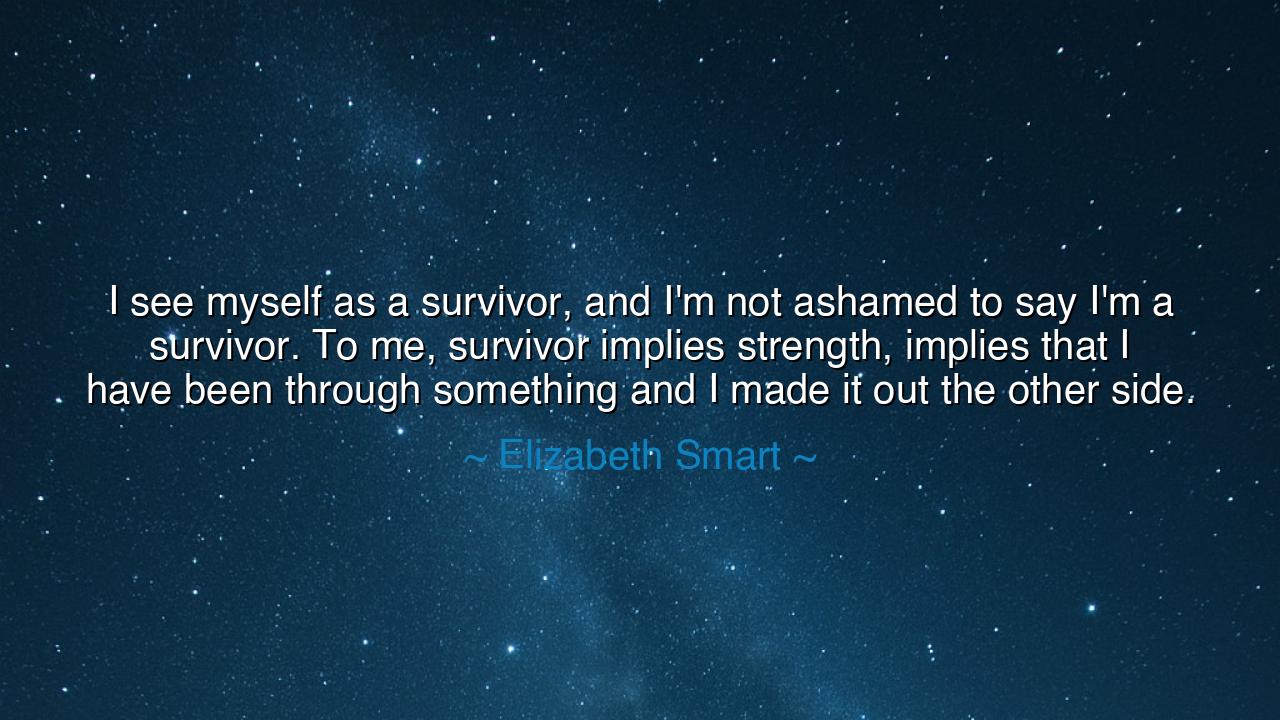
I see myself as a survivor, and I'm not ashamed to say I'm a
I see myself as a survivor, and I'm not ashamed to say I'm a survivor. To me, survivor implies strength, implies that I have been through something and I made it out the other side.






Elizabeth Smart, with unyielding courage, once declared: “I see myself as a survivor, and I’m not ashamed to say I’m a survivor. To me, survivor implies strength, implies that I have been through something and I made it out the other side.” In these words shines a truth that pierces through suffering: that the mark of life’s storms is not defeat but endurance, not ruin but rebirth. To call oneself a survivor is to proclaim not only survival of the body but triumph of the spirit.
The meaning of this statement lies in the transformation of pain into strength. Many who endure trials carry with them shame, as though the wounds inflicted upon them were their own fault. But Smart’s voice rejects this falsehood. She declares boldly that to survive is not disgrace but victory. For to stand after having been struck down, to breathe after suffocating sorrow, to rise from ashes still bearing hope—this is the very definition of strength. In saying she is “not ashamed,” she teaches that scars are not stains, but seals of resilience.
The origin of these words rests in her own harrowing story. As a child, Elizabeth Smart was kidnapped, held captive, and subjected to unspeakable suffering. The world watched in horror, yet years later, she did not choose silence or bitterness. Instead, she chose to speak, to advocate, to turn her wounds into a weapon for the protection of others. Thus when she proclaims herself a survivor, it is no idle boast but a declaration carved from fire: she endured the darkness, and she emerged with a voice of light.
History has given us other such survivors whose names are etched in eternity. Consider Viktor Frankl, who endured the death camps of Nazi Germany. Stripped of family, freedom, and dignity, he yet declared that man’s final freedom is to choose his response, to find meaning even in suffering. His survival was not merely of flesh but of spirit, and from it he gave the world Man’s Search for Meaning. Or think of Malala Yousafzai, struck down by violence yet rising to proclaim the right of girls to learn. Like Smart, they bore their trials not in silence, but as banners of strength.
The imagery of being “on the other side” is rich with hope. For every trial feels at first like an endless storm, with no horizon beyond the waves. Yet Smart’s words remind us that the storm passes, that beyond suffering lies a shore, and upon that shore stands the one who has endured. The survivor looks back not with shame, but with awe at their own endurance. And in that moment, survival itself becomes a crown, brighter than any untested ease could ever be.
The lesson for us is clear: do not despise your struggles, nor hide your scars. To have endured is itself a testimony. The world teaches that strength means never breaking, but the wiser truth is this: strength means breaking and yet rising again. Do not let shame bind you; rather, let endurance define you. For every survivor, whether of illness, grief, oppression, or violence, carries within them a story that can light the path for others.
Practically, this means embracing your own survival as a source of pride, not silence. Speak your truth when you are able, for your words may strengthen another weary soul. Give yourself permission to celebrate not only great victories but the simple act of enduring another day. And when others reveal their wounds, do not judge, but honor them as fellow survivors who walk with unseen crowns.
Thus, take Elizabeth Smart’s wisdom as a torch: to survive is not merely to endure—it is to triumph. Let no survivor be shamed, for their very existence is proof of their strength. Let us honor them, and let each of us, in our own trials, remember that survival itself is a victory, and that on the far side of suffering waits not only healing, but a new and unbreakable strength.






AAdministratorAdministrator
Welcome, honored guests. Please leave a comment, we will respond soon